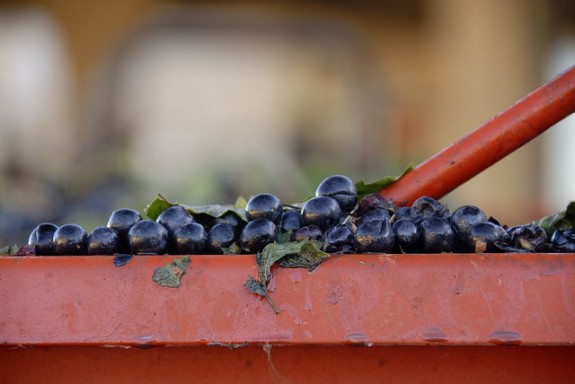The First French Winemakers Learned Everything They Knew From Etruscans
New research pins the arrival of wine making in France to around 525 B.C.

Photo: leodelrosa
French winemakers first learned the trade from the Etruscans, an ancient Italian civilization, kicking off domestic production around 525 B.C., according to new research by a team of scientists lead by Patrick McGovern. Archaeologists have long thought that the Etruscans brought wine and winemaking to southern France. But in their new study, McGovern and his team firmed up that assumption. They tested the residue found at the bottom of ancient Etruscan amphoras collected from a site in southern France. At the time, amphoras were used as shipping containers, carrying wine and olive oil and other products around the Mediterranean.
Chemical analyses of ancient organic compounds absorbed into the pottery fabrics of imported Etruscan amphoras (ca. 500–475 B.C.) and into a limestone pressing platform (ca. 425–400 B.C.) at the ancient coastal port site of Lattara in southern France provide the earliest biomolecular archaeological evidence for grape wine and viniculture from this country, which is crucial to the later history of wine in Europe and the rest of the world.
But the history of winemaking stretches back much, much further. The civilizations of the ancient Near East had been producing wine since at least as early as the Neolithic era, from around 10,000 to 2,000 B.C. In archaeology, understanding when and how ancient cultures met and collaborated is a difficult challenge. But the flow of wine, say the scientists in their study, can be used to track these connections.
The wine trade was one of the principal incentives for the Canaanites and Phoenicians, followed by the Greeks, Etruscans, and Romans, to expand their influence in the Mediterranean Sea. Where wine went, so other cultural elements eventually followed. Technologies of all kinds and new social and religious customs took hold in regions where another fermented beverage made from different natural products had long held sway.
According to the authors, the rise of wine making in southern France suggests not just trade of goods between the ancient Celtic French and the Etruscans, but the flow of ideas and technology.
Similarly to the transfer of winemaking by the Canaanites to the Egyptian Nile Delta millennia earlier, the native Celts at Lattara would have needed the expertise and knowledge of the Etruscans to plant their own vineyards and begin making wine.
Though the French were latecomers to the winemaking industry they’ve quickly made up for lost time. France is now the world’s largest producer of wine, account for 16% of world production.
If you wanted a taste of the old world, say the authors in their study, the closest modern approximation of the ancient wines would be a nice Greek retsina—a wine that bears the taste of pine resin, a material that was used to seal the amphoras during shipping.
More from Smithsonian.com:
/https://tf-cmsv2-smithsonianmag-media.s3.amazonaws.com/accounts/headshot/smartnews-colin-schultz-240.jpg)
/https://tf-cmsv2-smithsonianmag-media.s3.amazonaws.com/accounts/headshot/smartnews-colin-schultz-240.jpg)